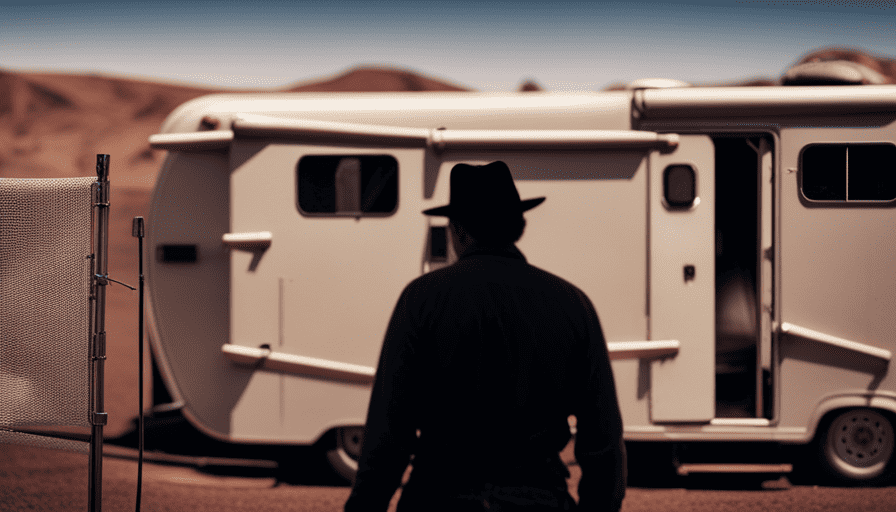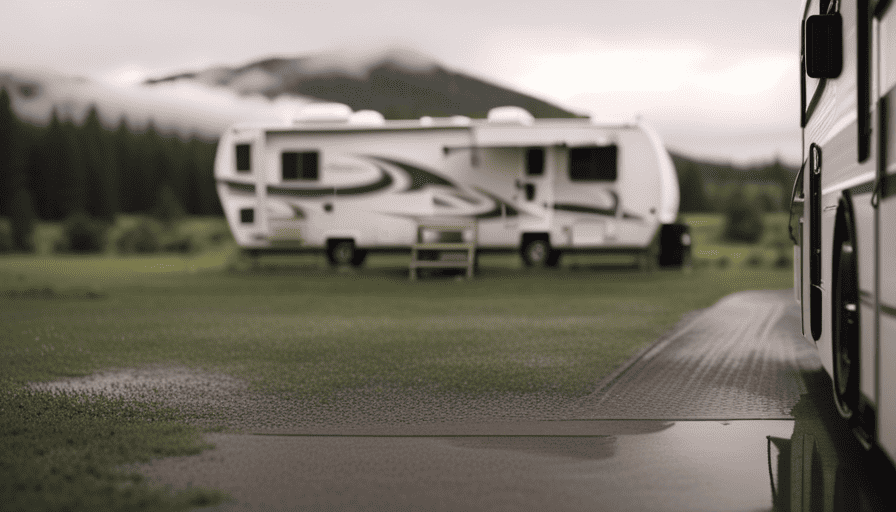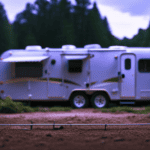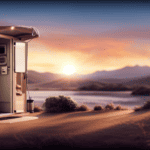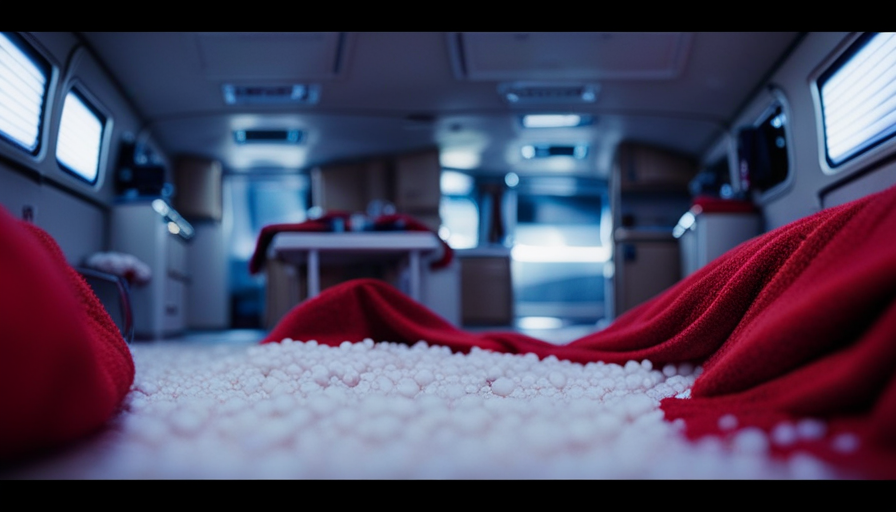Tired of pesky mice making themselves at home in your camper? Don’t worry! In this article, I’ll share with you some useful tactics and advice to keep those tiny intruders away from your beloved camper.
From sealing entry points to using natural deterrents, we’ve got you covered!
First and foremost, it’s important to seal any potential entry points. Mice can squeeze through tiny gaps, so make sure to check for any openings and seal them up tight.
Next, remove all food sources from your camper. Mice are attracted to crumbs and leftovers, so keep your camper clean and clutter-free.
Another effective method is to use mouse repellents. You can find various types on the market, such as peppermint oil or mothballs, that will keep those mice at bay.
Additionally, set traps strategically around your camper to catch any mice that may have already invaded.
Remember, prevention is key! Regularly inspect and maintain your camper to ensure there are no hiding spots for these unwanted guests. And if all else fails, don’t hesitate to seek professional help.
So, let’s get started and say goodbye to those unwanted guests once and for all!
Key Takeaways
- Sealing entry points and maintaining the camper is crucial to prevent mice from entering.
- Remove all food sources and store food in airtight containers to make the camper less attractive to mice.
- Use natural deterrents like peppermint oil or dryer sheets, and consider using ultrasonic devices or DIY deterrents.
- Set traps strategically and regularly inspect and maintain the camper to catch and prevent mice infestations.
Seal Entry Points
To keep those pesky mice from sneaking into your camper, make sure to seal up any entry points you find. Preventive measures are crucial in keeping these unwanted guests out of your living space. Mice can squeeze through small openings, so it’s important to thoroughly inspect your camper for any potential entry points.
Start by checking for cracks or gaps in the walls, floors, and windows. Use a silicone-based caulk or weatherstripping to seal these areas effectively. Pay close attention to areas where pipes or wires enter your camper, as mice can use these as entry points as well.
Additionally, make sure to install door sweeps on all exterior doors to prevent mice from slipping under. Effective sealing is key in keeping mice out, so take the time to properly seal all possible entry points.
Now that you’ve sealed up your camper, it’s time to address another important aspect of mouse prevention: removing food sources. By denying mice access to food, you make your camper less attractive to them.
Remove Food Sources
Eliminate any potential food sources that may attract those unwanted visitors into your cozy mobile sanctuary. Mice are always on the lookout for a free meal, so it’s important to keep all food securely stored away.
Here are a few practical tips to help you keep your camper mouse-free:
-
Use airtight containers: Store all your food in sealed containers to prevent mice from smelling and accessing it. This includes pantry items like cereal, snacks, and pet food.
-
Maintain proper hygiene: Keep your camper clean and free of crumbs or food residue. Sweep the floors regularly and wipe down surfaces after meals. Don’t forget to clean up any spills or food scraps immediately.
-
Empty trash frequently: Dispose of your trash regularly, especially food waste. Invest in a sturdy trash can with a tight-fitting lid to deter mice from rummaging through it.
-
Secure outdoor food sources: If you’re camping in an area with wildlife, make sure to store any outdoor food sources, such as coolers or grills, in a secure location away from your camper.
-
Avoid leaving pet food out overnight: If you have pets traveling with you, don’t leave their food out overnight. Instead, feed them during designated meal times and remove any uneaten food promptly.
By taking these simple steps, you can greatly reduce the chances of attracting mice into your camper.
Next, let’s explore the use of mouse repellents to further protect your mobile sanctuary.
Use Mouse Repellents
If you want to ensure a mouse-free environment in your cozy mobile sanctuary, try using mouse repellents! There are several mouse repellent alternatives available that can help keep those pesky critters away from your camper.
One option is to use natural deterrents such as peppermint oil or dryer sheets. The strong scent of peppermint oil is known to repel mice, so you can place a few drops on cotton balls and scatter them around your camper. Similarly, dryer sheets can be placed in various areas to keep mice at bay.
Another option is to create your own DIY mouse deterrents. For example, you can mix equal parts vinegar and water in a spray bottle and spray it around the perimeter of your camper. Mice dislike the strong smell of vinegar and will steer clear of it. Additionally, you can sprinkle cayenne pepper or garlic powder near entry points to deter mice from coming inside.
By using these mouse repellents, you can create an environment that is less inviting to these unwanted guests.
Now, let’s move on to the next step of keeping mice out of your camper: setting traps.
Set Traps
Ready to catch those pesky critters? Let’s dive into the next step: setting traps! When it comes to mouse prevention, effective trapping plays a crucial role.
Here are some tips to help you keep mice out of your camper using traps.
First, choose the right type of trap. Snap traps are the most common and effective option. They’re easy to set up and can quickly catch mice. Place the traps near areas where you’ve noticed mouse activity, such as along walls or near food sources.
Next, bait the traps with irresistible treats for mice. Peanut butter, chocolate, or a small piece of cheese are all great options. Make sure to secure the bait to the trap so that mice can’t easily steal it without triggering the trap.
Check the traps regularly, preferably daily, and remove any trapped mice promptly. Wear gloves to handle the traps and dispose of the mice in a sealed bag or container.
Now that you know how to set traps, let’s move on to the next section about keeping your camper clean and clutter-free. By maintaining a tidy environment, you can further deter mice from entering your camper.
Keep Camper Clean and Clutter-Free
Maintain a meticulous and organized living space in your mobile home to discourage the intrusion of pesky critters. Keeping your camper clean and clutter-free is not only essential for your own comfort, but it also plays a crucial role in pest control. Here are some organization tips and pest control techniques to help keep mice out of your camper.
Start by decluttering your living area and storage spaces. Get rid of any unnecessary items that may attract mice, such as cardboard boxes or old clothing. Invest in storage containers with tight-fitting lids to store your belongings and prevent mice from accessing them.
Regularly clean your camper, paying special attention to areas where food crumbs and spills may accumulate. Sweep the floors, wipe down countertops, and vacuum upholstery to eliminate any potential food sources for mice. Be sure to also remove any garbage promptly and keep it in a sealed container outside your camper.
In addition to keeping your camper clean, consider using natural deterrents like peppermint oil or dryer sheets. Mice dislike the smell of these substances, so placing them in strategic locations can help deter them from entering your camper.
By maintaining an organized and clean living space, you’re taking proactive steps to prevent mice from infesting your camper. In the next section, we’ll discuss how to store food properly to further discourage these unwanted guests.
Store Food Properly
To prevent the intrusion of pesky critters, make sure to store your food properly in the camper. Proper food storage techniques are essential for keeping mice out of your camper and ensuring that your food remains fresh and safe to eat.
First and foremost, always store your food in airtight containers to prevent mice from smelling and accessing it. Avoid leaving any food items out in the open, as this can attract mice and other pests. Instead, store perishable items in the refrigerator and non-perishable items in sealed cabinets or storage bins.
Additionally, it’s important to clean up any crumbs or spills immediately. Mice are attracted to food remnants, so keeping your camper clean and clutter-free is crucial. Sweep the floors regularly and wipe down countertops and surfaces to eliminate any traces of food. Don’t forget to empty your trash regularly and seal it tightly to prevent mice from rummaging through it.
By following these proper food storage techniques and preventing mice access to food, you can greatly reduce the risk of mice infestation in your camper.
In the next section, we’ll explore natural deterrents that can further help in keeping these unwanted guests at bay.
Use Natural Deterrents
Now that you know how important it is to store food properly to keep mice out of your camper, let’s explore another effective method: using natural deterrents. Natural remedies and homemade repellents can be a great solution for those who prefer a more eco-friendly approach.
There are several natural ingredients that mice find repulsive, and incorporating them into your camper can help keep these unwanted guests away. Peppermint oil, for example, has a strong scent that mice dislike. Soak cotton balls in peppermint oil and place them strategically around your camper to create a barrier. Another effective natural deterrent is vinegar. Its strong odor can deter mice from entering your camper. Simply mix equal parts of vinegar and water in a spray bottle and spray it in areas where mice are likely to enter.
To further enhance the effectiveness of these natural remedies, consider creating a table like the one below to keep track of the areas where you have used them:
| Area | Peppermint Oil | Vinegar Spray |
|---|---|---|
| Kitchen | X | X |
| Pantry | X | |
| Storage Compartments | X |
Using natural deterrents is an excellent way to keep mice out of your camper without relying on harmful chemicals. However, if you’re looking for an additional layer of protection, you may want to consider using ultrasonic devices. These devices emit high-frequency sounds that are undetectable to humans but can repel mice.
Use Ultrasonic Devices
Enhance your camper’s defense against unwanted intruders with the use of ultrasonic devices, ensuring a peaceful and pest-free environment. Ultrasonic devices emit high-frequency sound waves that are inaudible to humans but highly irritating to mice and other rodents.
Here are some key points to consider when using ultrasonic devices as a mouse deterrent:
-
Effectiveness debate: Ultrasonic devices have been subject to a lot of debate regarding their effectiveness in repelling mice. While some people swear by them, others claim that mice quickly adapt and become immune to the sound. It’s important to keep in mind that results may vary depending on the specific device and the severity of the infestation.
-
Alternative methods: If you’re skeptical about the effectiveness of ultrasonic devices or want to use additional deterrents, there are alternative methods available. Non-ultrasonic deterrents include peppermint oil, fabric softener sheets, and mothballs. These can be used in conjunction with ultrasonic devices for added protection.
-
Regular maintenance: While ultrasonic devices can help keep mice away, it’s essential to regularly inspect and maintain your camper to prevent any potential entry points. Seal any cracks or openings, check for chewed wires, and keep your camper clean and clutter-free.
By incorporating ultrasonic devices into your mouse prevention strategy and combining them with other alternative methods, you can maximize your camper’s protection against unwanted furry visitors. Regularly inspecting and maintaining your camper is also crucial in ensuring a pest-free environment.
Regularly Inspect and Maintain Your Camper
Make sure you stay on top of inspecting and maintaining your camper so those pesky little critters don’t stand a chance! Regular inspections and proper maintenance are key to keeping mice out of your camper. One important aspect of maintenance is to regularly inspect the seals on your camper. Mice can easily enter through small gaps or cracks in the seals, so it’s crucial to ensure they are intact and in good condition. Use the table below as a checklist to guide your inspection:
| Area to Inspect | What to Look For | Action to Take |
|---|---|---|
| Doors and Windows | Gaps or cracks | Seal with caulk |
| Vents and Holes | Openings or chewed areas | Patch or cover |
| Exterior walls | Damaged or loose panels | Repair or replace |
| Undercarriage | Holes or loose parts | Seal or secure |
In addition to inspecting seals, it’s important to repair any damages that may have occurred. This includes fixing chewed wires, repairing holes in the walls, and replacing damaged insulation. By regularly inspecting and maintaining your camper, you can prevent mice from finding their way in. However, if you still find signs of mice despite your efforts, it may be time to seek professional help.
Seek Professional Help if Needed
If all else fails and you’re still facing unwanted guests in your cozy home on wheels, it might be time to consider enlisting the assistance of a professional.
When it comes to dealing with mice infestations in your camper, hiring exterminators can provide numerous benefits. One of the main advantages of professional pest control is their expertise and knowledge in dealing with mice. They have the necessary training and experience to identify the root cause of the infestation and implement effective measures to eliminate it. They know where to look for entry points, nesting areas, and hiding spots that may be inaccessible to the average camper owner.
Additionally, exterminators have access to specialized tools and products that are not readily available to the general public. These tools are designed to effectively and safely remove mice from your camper without causing harm to you or your vehicle. They can also provide valuable advice on preventive measures you can take to keep mice out in the future, such as sealing gaps and storing food properly.
Furthermore, professional pest control services offer a guarantee for their work. If the infestation persists after their treatment, they will return and take additional measures at no extra cost. This can give you peace of mind knowing that you have a reliable solution to your mouse problem.
If you’ve tried all the DIY methods and are still struggling with mice in your camper, hiring professional exterminators can be a wise decision. Their expertise, specialized tools, and guarantee can help ensure that your home on wheels remains pest-free.
Frequently Asked Questions
How do I know if there are mice in my camper?
If you suspect a mice infestation in your camper, there are a few signs to look out for.
Droppings are a common indication, typically found near food sources or nesting areas.
You may also notice chewed up materials, such as paper or fabric, as mice love to build nests.
If you do find mice, it’s important to act quickly.
Remove any potential food sources, seal off entry points, and consider using traps or calling a professional pest control service to address the issue effectively.
Are there any specific types of food that attract mice more than others?
There are certain types of food that can attract mice more than others. Some common examples include grains, cereals, and pet food. It’s important to store these items in airtight containers to prevent their scent from reaching mice.
Additionally, there are natural mouse repellents that can be used to deter mice from entering your camper, such as peppermint oil or mothballs. These can be placed strategically around your camper to help keep mice away.
Can mice chew through camper materials like wood or plastic?
Mice have a habit of chewing through various materials, including wood and plastic. Their teeth continuously grow, so they gnaw on objects to keep them at a manageable length.
When it comes to campers, mice can easily find entry points through small gaps, cracks, or openings in walls, floors, or ceilings. These common access points should be inspected and sealed to prevent mice from entering and causing damage.
Is it necessary to use both mouse repellents and traps, or can one be enough?
Using both mouse repellents and traps can be an effective strategy for keeping mice out of your camper. The pros of using both is that the repellents can deter mice from entering, while the traps can catch any mice that do manage to get inside.
However, there are alternatives to consider. You can use natural deterrents like peppermint oil or mothballs, or seal off any potential entry points.
Ultimately, it’s important to find a method that works best for you and your camper.
How often should I inspect and maintain my camper to ensure mice stay out?
Inspecting and maintaining your camper regularly is key to keeping mice out. By doing so, you can identify and address any potential entry points or signs of infestation before they become a problem. Additionally, taking preventive measures to prevent mice from getting into your camper in the first place can significantly reduce the chances of an infestation. This includes sealing any gaps or cracks, storing food properly, and keeping the camper clean and clutter-free.
Are the Methods to Keep Chipmunks Out of a Camper the Same as Keeping Mice Out?
When it comes to keeping chipmunks and mice out of a camper, the prevention methods may differ. While mice are small and can easily squeeze through tiny openings, chipmunks are skilled climbers. So, for effective mice and chipmunks prevention tips, it’s important to seal all potential entry points, including gaps in doors, windows, and vents, as well as utilizing rodent-repellent products. Additionally, keeping food sources away and maintaining cleanliness applies to both pests.
What are the best methods for preventing mice from entering a camper in the first place?
The best methods for getting rid of camper mice involve sealing any entry points with steel wool or expanding foam. Keep food in airtight containers and remove any crumbs or spills. Place mouse traps around the camper and use peppermint oil or ultrasonic devices as natural deterrents.
Conclusion
In conclusion, keeping mice out of your camper is essential for a comfortable and stress-free camping experience. By sealing entry points, removing food sources, using repellents and traps, keeping the camper clean and clutter-free, and utilizing natural deterrents and ultrasonic devices, you can effectively prevent mice from entering your space.
Remember to regularly inspect and maintain your camper to ensure there are no potential entry points for these pesky critters. So, why let mice ruin your camping fun when you can take these practical steps to keep them away?

